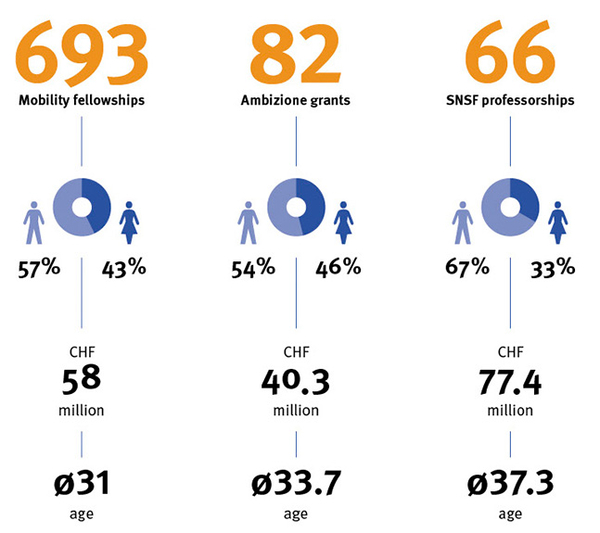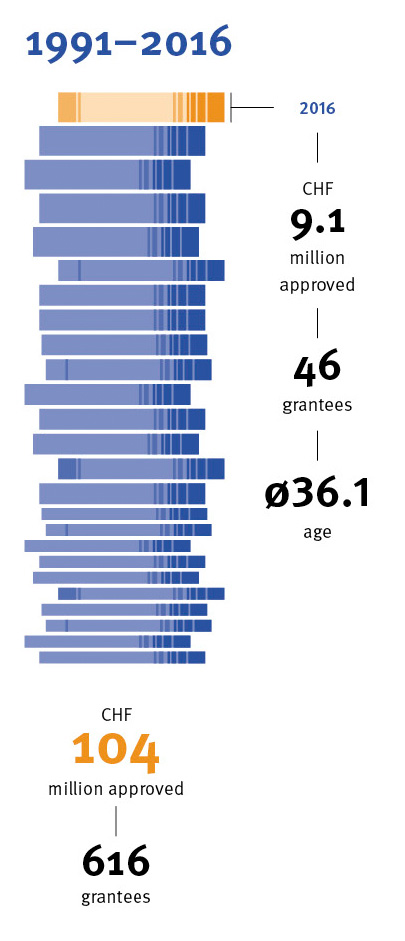Promoting early independence
Switzerland needs more highly qualified young researchers if it is to remain competitive in global science. By modifying its career funding schemes, the SNSF is aiming to create more appealing and clearer career prospects for young researchers in academia.
Funding by scheme 2016
Three career schemes compared

In 2016, the SNSF used almost a quarter of its budget to promote the careers of promising young researchers in Switzerland. It invested 207 million Swiss francs in approximately 1,100 fellowships and grants that cover the salaries of young applicants and, in part, also their research or project costs. In addition, 76% of the approximately 10,000 people working in research projects funded by the SNSF are 35 or under – here too, promoting young scientists is a priority.
A change is needed
“These figures show how strongly the SNSF feels about educating highly qualified young scientists and keeping them within the Swiss science system,” says Matthias Egger, President of the National Research Council. But simply maintaining the status quo will not be enough: “We have to make academic careers more appealing in this country, so that Swiss research can continue to compete internationally at the highest level. We need young researchers who are critical and question existing knowledge or develop it in novel ways – such research leads to innovation and is therefore crucial to Switzerland’s economic prosperity and affluence.” Egger, a public health expert from the University of Bern, is convinced that Switzerland needs to present good arguments and offer favourable conditions if it is to hold its own in the increasingly fierce global competition for the most talented scientists. “As the leading funder of basic research in Switzerland, the SNSF is expected to make a major contribution to this goal,” says Egger, for whom this challenge is just as much personal as it is national.
Marie Heim-Vögtlin grants
25 years of support for women researchers

The SNSF promotes early independence
In 2016, the SNSF started modifying its career funding schemes step by step and bringing them more closely into line with project funding, so that all phases of an academic career are covered. With these innovations, the SNSF aims to strengthen the competitiveness of Swiss research and to support the planned changes to academic career structures in Switzerland, which are set out in the Federal Council’s report “Massnahmen zur Förderung des wissenschaftlichen Nachwuchses in der Schweiz” (Measures to promote young researchers in Switzerland). The SNSF is looking to position its career schemes more clearly and effectively. In future, they will be geared more specifically to the promotion of academic careers, scientific excellence and the early independence of up-and-coming young researchers. For Beatrice Beck Schimmer, president of the Specialised Committee for career funding, the final point is crucial: “We will give young researchers who have the potential for an academic career the opportunity to make their mark with their own research project”.
Setting a course for the future
To implement all the innovations envisaged in its multi-year programme 2017–2020 and carry out its daily business, the SNSF had requested federal funding of approximately 4.5 billion francs. In summer and autumn 2016, the Swiss parliament discussed the Federal Dispatch on the Promotion of Education, Science and Innovation. Ultimately, it allocated a total budget of 4.1 billion francs to the SNSF. Although the SNSF had to shelve some of its innovation projects because of insufficient funding, it followed through on measures to reposition its career schemes in the 2017–2020 funding period. This shows that the SNSF remains fully committed to promoting young scientists and facilitating their scientific independence.
Ambizione and SNSF professorships: more competition
The SNSF is continuing the Ambizione funding scheme for young researchers who wish to conduct a project of their own at a Swiss higher education institution. As of 2017, the scheme will also be open to all those who have a non-professorial research position with good career prospects. Ambizione grants can therefore be requested with or without a salary. “This is aimed at generating direct competition for research funds between all young researchers at the same career level, regardless of whether they already hold a position,” says the head of the SNSF’s Careers division, Marcel Kullin. The same applies to SNSF professorships. As of 2018, they will be replaced by a new scheme that will include the existing SNSF professorships and be open to newly appointed assistant professors.
Mobility funding for an early stay abroad
Thanks to international mobility and networking, researchers are able to work and exchange knowledge with the best in their field. Mobility is therefore essential for a successful career in research and science. “Our mobility funding sets in fairly early to create better options for international networking and reduce grantees’ dependence on their home institution,” says Beatrice Beck Schimmer about this second main pillar of the innovation project. In 2018, the SNSF plans to introduce a new funding scheme, Postdoc.Mobility, to replace the existing Advanced Postdoc.Mobility fellowships. Postdoc.Mobility will enable researchers in all disciplines supported by the SNSF to make a research stay abroad in order to improve their scientific profile and become more self-reliant. To ensure that their stay abroad takes place early in their career, young researchers must submit their application for a research stay no later than three years after obtaining their doctorate.
After the discontinuation of Early Postdoc.Mobility fellowships, Postdoc.Mobility will be continued as the only mobility funding scheme at postdoc level as of 2021. “This simplifies the range of mobility funding schemes offered by the SNSF and makes things clearer for young scientists,” says Marcel Kullin.
Gender equality measures
The SNSF continues to promote gender equality and equal opportunities through supplementary measures such as a child care allowance or a temporary reduction in working hours at postdoc level. As one of its innovations, the SNSF plans to launch an attractive and flexible new scheme for women postdocs in 2017: PRIMA. In the year under review, 40 per cent of the young researchers supported by the SNSF’s career funding schemes were women.
